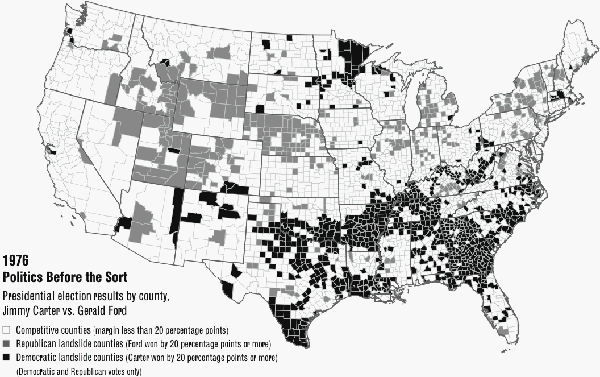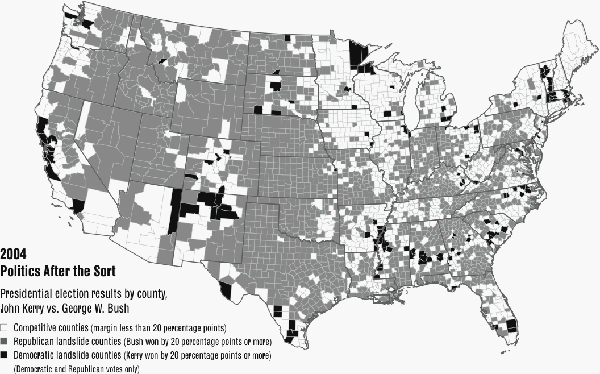The Big Sort
- Improvements in transportation systems has made more areas more accessible to inward migration. Jets and improvements to highway systems have given people more options on where to live.
- Improvements in technology have also increased mobility. It is hard to remember a day without the Internet and email, let alone without a fax machine. Add cellular phones to the mix and now people can live, work, trade stocks, get a college degree and do just about anything from anywhere.
- Our aging population has meant that an increased number of people are now in those peak-earning years where pre or semi-retirement provides the best of both worlds - increased leisure time and increase discretionary income (without the expense of kids).
- Rising affluence has simply given people more options. Given more options, people will choose to live in places they like.
This obvious final point forms the backdrop for the book - people like to live amongst people and in environments that reinformce their values and world view. This is not a political statement on behalf of society as much as it is human nature, a point that Bishop drives home with discussions on human psychology experiments identifying a "tribe" mentality. It is that natural human tendency that has, through this migration, naturally "sorted" us into areas of like-minded individuals.
Bishop uses his own experience in moving to Austin, Texas as a real-world example. He relates how he and his wife drove around looking at neighborhoods until they found one that felt comfortable. It had a layout, look and feel of a place they would like to live. He describes some of the subtle references - types of car, type of home, bumber stickers, landscaping, lawn ornaments, etc... - that subconsciously sold him on the location. Once settled, he found that the predominant political view in his neighborhood was similar to his own. In retrospect, no surprise given the signals.
 Republican and Democrat landslide counties in the 1976 presidential election, before the Big Sort.
Republican and Democrat landslide counties in the 1976 presidential election, before the Big Sort.
 Republican and Democrat landslide counties in the 2004 presidential election, after the Big Sort.
Republican and Democrat landslide counties in the 2004 presidential election, after the Big Sort.
There is a lot of good discussion in this book on the political and social ramifications of this self-sorting, like how a "tribe" mentality will develop in these areas to reinforce and amplify the prevailing wisdom. This is probably one of the more significant impacts of sorting and explains a lot of what we regularly see in our small towns and rural areas - an unwillingness to consider new ideas.
Even in places where there are large, imminent problems that are well understood and with solutions that are fairly clear, many leaders in our small towns will fail to make a change. We've heard people theorize that this social inertia is caused by poor education, closed-mindedness, relative isolation to new ideas and simply character deficiencies. These theories have never set well with me, largely because my experience tells me that they are way off the mark.
Bishop's book provides a more plausible explanation: Because we have self-sorted into groups of like-minded people, the accepted norms are reinforced (right of wrong) to the point where the core assumptions behind those norms are unassailable.
In a backhanded way, it is somewhat reassuring to know that my big-city planning colleagues are dealing with their own tribe mentalities, albeit in a different sorting.
This is a great book - highly recommended. And for fun, here is an interview with Bill Bishop on The Daily Show.

